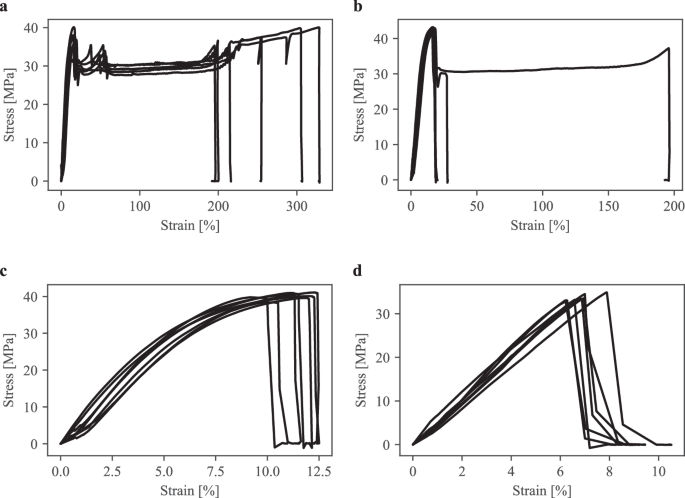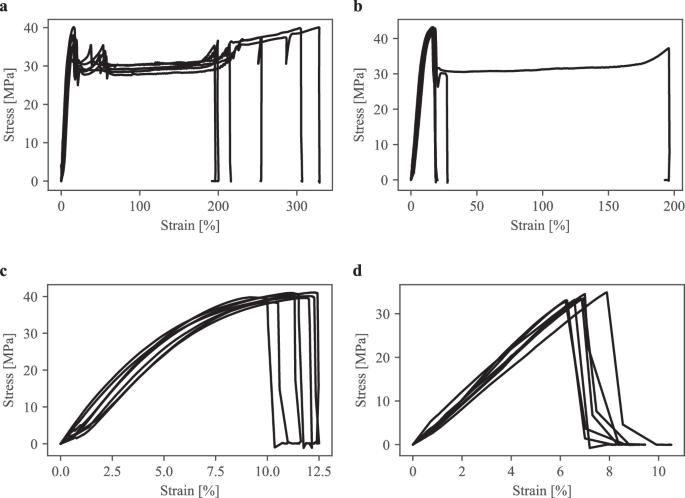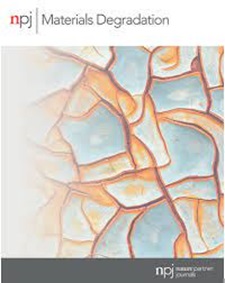聚丁二酸丁二醇酯水解过程中拉伸性能和生物降解与分子质量的关系
IF 7.6
2区 材料科学
Q1 MATERIALS SCIENCE, MULTIDISCIPLINARY
引用次数: 0
摘要
可生物降解聚合物的分子质量通常可以解释室外环境中不同的生物降解结果,并决定聚合物样品的机械性能和脆性。因此,我们研究了聚(丁二酸丁二醇酯)(PBS)的分子质量与其拉伸性能和矿化之间的关系。我们发现,随着分子质量的降低,杨氏模量在上升,而拉伸强度和断裂伸长率在下降。在 Mw 为 80,000 g/mol 到 110,000 g/mol 之间发现了韧性-脆性转变。水解后测定的机械性能与分子质量的关系与对新鲜合成的 PBS 进行的研究有很大不同。在田间土壤和堆肥土壤的混合物中,微生物对二氧化碳的生物降解始于 8060 克/摩尔和 26666 克/摩尔之间的分子质量。这些结果对于估算用 PBS 制成的产品的使用寿命至关重要。本文章由计算机程序翻译,如有差异,请以英文原文为准。


Dependency of tensile properties and biodegradation on molecular mass during hydrolysis of poly(butylene succinate)
The molecular mass of biodegradable polymers often explains the varying biodegradation results in outdoor environments and determines the mechanical properties and embrittlement of polymer samples. Accordingly, we have investigated the relationship between the molecular mass of poly(butylene succinate) (PBS) and its tensile properties and mineralisation. With decreasing molecular mass, we found that Young’s modulus was rising while tensile strength and elongation at break were decreasing. A ductile-brittle transition was found between a Mw of 80,000 g/mol and 110,000 g/mol. The dependency of mechanical properties on molecular mass as determined after hydrolysis differed significantly from a study performed on freshly synthesised PBS. Biodegradation to CO2 by microorganisms in a mixture of field soil and compost soil was found to begin at a Mw between 8060 g/mol and 26,666 g/mol. These results are essential for estimating the service life of products made from PBS.
求助全文
通过发布文献求助,成功后即可免费获取论文全文。
去求助
来源期刊

npj Materials Degradation
MATERIALS SCIENCE, MULTIDISCIPLINARY-
CiteScore
7.80
自引率
7.80%
发文量
86
审稿时长
6 weeks
期刊介绍:
npj Materials Degradation considers basic and applied research that explores all aspects of the degradation of metallic and non-metallic materials. The journal broadly defines ‘materials degradation’ as a reduction in the ability of a material to perform its task in-service as a result of environmental exposure.
The journal covers a broad range of topics including but not limited to:
-Degradation of metals, glasses, minerals, polymers, ceramics, cements and composites in natural and engineered environments, as a result of various stimuli
-Computational and experimental studies of degradation mechanisms and kinetics
-Characterization of degradation by traditional and emerging techniques
-New approaches and technologies for enhancing resistance to degradation
-Inspection and monitoring techniques for materials in-service, such as sensing technologies
 求助内容:
求助内容: 应助结果提醒方式:
应助结果提醒方式:


